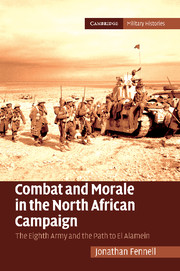Book contents
- Frontmatter
- Contents
- List of illustrations
- List of figures
- List of maps
- List of tables
- Acknowledgements
- List of abbreviations
- Maps
- Introduction
- 1 Morale crisis and recovery
- 2 Technology, firepower and morale
- 3 Quality of manpower and morale
- 4 Environment, provisions and morale
- 5 Welfare, education and morale
- 6 Leadership, command and morale
- 7 Training and morale
- 8 In search of a theory to explain combat morale in the desert
- Conclusion
- Appendix: Battle maps
- Bibliography
- Index
- References
5 - Welfare, education and morale
Published online by Cambridge University Press: 24 February 2011
- Frontmatter
- Contents
- List of illustrations
- List of figures
- List of maps
- List of tables
- Acknowledgements
- List of abbreviations
- Maps
- Introduction
- 1 Morale crisis and recovery
- 2 Technology, firepower and morale
- 3 Quality of manpower and morale
- 4 Environment, provisions and morale
- 5 Welfare, education and morale
- 6 Leadership, command and morale
- 7 Training and morale
- 8 In search of a theory to explain combat morale in the desert
- Conclusion
- Appendix: Battle maps
- Bibliography
- Index
- References
Summary
I have always regarded as the primary object of both branches of my directorate the maintenance of the morale of all ranks.
(General H. Willans, the Director-General of Welfare and Education, 1941)There is nothing more soulless than … a patriotism which does not concern itself with the welfare and dignity of the individual.
(S. L. A. Marshall)Hew Strachan has stated that one of the main reasons why the British Army suffered a crisis in its morale in 1941–2 was that the army's institutions were ‘ill-adapted to the needs of a citizen army in a world war’. The expansion of the pre-war professional army into a citizen army of millions put tremendous stress on those normally assigned the duty of maintaining morale. Even before the war, Ronald Adam, while Deputy Chief of the Imperial General Staff (DCIGS), suggested that ‘outside help’ was needed for regimental officers to deal with matters affecting morale, such as welfare, in a newly expanded wartime army. On the outbreak of hostilities, it was soon apparent that he was right. Not only were officers fully occupied with the basic organisation of the many new recruits, and were thus less able to devote time to the question of welfare, but some of the problems that they had to deal with were outside the experience of the average junior officer. The War Office looked into the matter and, in the autumn of 1939, appointed Lieutenant-General John Brown to the post of War Office Adviser on Welfare.
- Type
- Chapter
- Information
- Combat and Morale in the North African CampaignThe Eighth Army and the Path to El Alamein, pp. 151 - 187Publisher: Cambridge University PressPrint publication year: 2011

